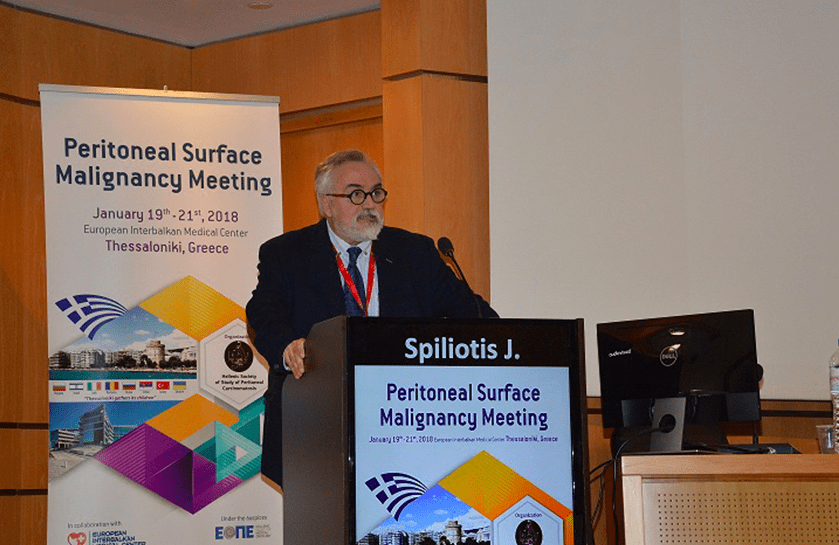
Leading Greek Professor of Oncology, Giannis Spiliotis, says "Cancer is being defeated, not to say beaten but defeated and over the next ten years it will become a chronic disease."
Professor Spiliotis is a well- known surgeon, oncologist, and director of Clinical Counseling for Peritoneal Malignancy and Surgical Oncology at the Thessaloniki Medical Center and Athens Medical Center.
Born in 1959, in the area near the Panachai Stadium, he attended the Medical School of Patras and was one of the first 60 students of the School, which was founded that year.
Immediately after his specialty at St. Andrew's Hospital, Professor Spiliotis, worked as a surgeon at the Montpellier University of Cancer Institute, where he returned to Patras in 1992.
From 1993 to 1997 he served at the Surgery Clinic of the University of Patras and then until 2009 in the Surgery Clinic of the Mesolonghi Prefectural Hospital and then served as Coordinator of the First Surgical Department at the Metaxa Hospital in Piraeus.
Professor Spiliotis spoke to 104.9 FM Agency on the occasion marking his cancer report "Who are you? Where do you live; How Do You Live?" at the 2nd International Conference of Medical Leadership and Innovation AMLI 2018, which was held from the 23rd to 25th of November at the Athens Concert Hall.
The title of his speech is also the title of his book, published by Janus and deals with cancer mechanisms and responds to critical questions that affect cancer patients.
According to Professor Spiliotis, up to 30% of cancers are due to hereditary predisposition, “It has been shown that 25-30% of cancers are due to a hereditary predisposition and since early 2000, we decoded the human gene and now we have early intervention for these people, which helps prevent the development of malignancies."
The best-known example is of actress Angelina Jolie he said, who had a double mastectomy a few years ago. The surgeon said like in Jolie's case, there are also other cases with hereditary predisposition and "if someone in a family develops, for example, a myeloid thyroid carcinoma, then the thyroid is removed from the whole family."
The second question, "Where do you live?" Has to do, as Mr Spiliotis says, with environmental conditions, where in some areas or under certain conditions people develop cancer for various reasons.
According to Professor Spiliotis, waking up before 6am also increases the chances of carcinogenicity and the third question, "How do you live?" Has to do with the routines of everyday life that can also under certain circumstances trigger cancer.
An example, Professor Spiliotis gave, “is waking up before 6am, which has been shown to increase the likelihood of cancer because in the early hours the brain instructs the adrenal glands to secrete the cortisol, which is a stress hormone and stress, any stress, can trigger carcinogenic mechanisms, eg emotional stress. Divorce increases the prevalence of breast cancer. Another example is hair dyeing more than 9 times a year, which increases the risk of developing leukemias."
"It does not mean, of course, that anyone who dyes their hair more than nine times a year or someone who has split will suffer from cancer,” he stressed. "But, lifestyle, exercise, proper nutrition, all play an important role in prevention. You need to be cautious with a range of things like smoking, driving without a helmet, etc."
As for "why me?", a question that many patients ask, Professor Spiliotis says, "We were created by image and likeness. We have forgotten, however, that the likeness is not a possibility of this moment, but somewhere in the future. The cancer is defeated, not to say beaten. Over the next ten years, cancer will be a chronic disease. Like tuberculosis, as is diabetes now. You will live 25-30 years and you may die either from a cancer complication or from another issue."
From 1970 to 2010, "we have added 15 years of extra life to many patients", says the distinguished surgeon, explaining that in the 1970s patients died in six months or a year, while in 2010 they had an extra 15 years of life.
"And what I'm saying about cancer is, do not be afraid, victory is near.”

